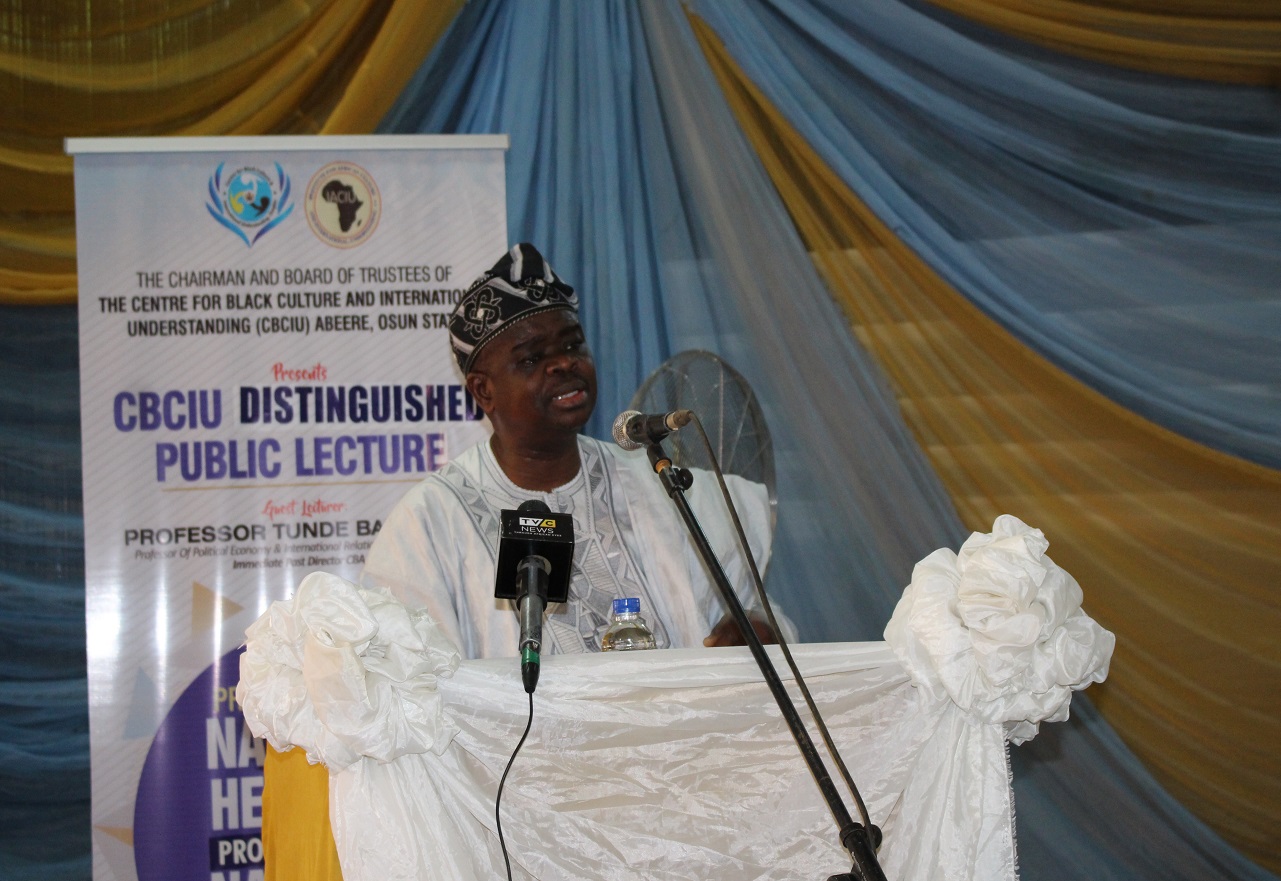Stakeholders make case for preservation of heritage at CBCIU lecture

Players in the culture sector underscore why Nigeria and Africa's heritage needs to be preserved at this year�s Distinguished Lecture of the Centre for Black and Culture and International Understanding (CBCIU).The Centre for Black Culture and International Understanding (CBCIU), Osogbo, Osun State was sent agog, February 3 for its 2018 Distinguished Lecture. The event also used to mark the 67th birthday of the Centre�s Board of Trustees chairman, Prince Olagunsoye Oyinlola, signposted another step in its ongoing revival.
The Centre for Black Culture and International Understanding (CBCIU), Osogbo, Osun State was sent agog, February 3 for its 2018 Distinguished Lecture. The event also used to mark the 67th birthday of the Centre�s Board of Trustees chairman, Prince Olagunsoye Oyinlola, signposted another step in its ongoing revival.
The ex-governor, who highlighted how Nigeria would have lost the Osun Grove, one of the country�s UNESCO World Heritage Sites, to activities including deforestation, hunting, religious conversion, fishing, felling of trees and hunting, but for the intervention of the late Adunni Olorisha (Suzanne Wenger), stressed that the protection and projection of all the country�s national heritage is a job for all. It is, therefore, important to ensure that we collectively help to protect these treasures to keep our memories of the past alive. While we try as much as we can to carry this out as a collective duty, we must also ensure that we project the heritages around us,he said. In his lecture entitled Reflections on the need for the promotion of Nigeria�s cultural heritage, Babawale, a professor of Political Economy and International Relations at the University of Lagos, defined culture and stated its importance. For him, �culture is fundamental to humans; it is mankind�s defining characteristic, apart from physical presence, that differentiates humans from the lower animals.� Its attributes, he further noted, included dynamism, sensitivity and being non-hereditary.
The former Director General of the Centre for Black and African Arts and Civilization (CBAAC), further explained that cultural heritage was one of the indices of the civilisation of a people but that �the cultural heritage of the Nigerian peoples as manifested in their music, performances, costumes, body adornment, languages, religions, indigenous knowledge, laws, medicine, hospitality, values, cuisine recreational games, art and crafts, rites of passage, architecture, etc. have come under the corrosive impact of foreign cultural values as a result of modernism, urbanisation and globalisation.�
He expressed regret that �the orientation and focus of Nigerians have been altered drastically in all areas of life, namely; language, religion, mode of dressing, beliefs, value systems, politics, economy, etc. leading to the disappearance of virtues such as hard work, perseverance, honesty, transparency, accountability and above all, the omoluabi qualities which was the ultimate and a necessary requirement for good citizenry and true development.�
The professor noted the neglect of indigenous genres, including Juju, Sakara, Highlife, Afrobeats and Akwete laden with wisdom and philosophy for modern music that �has now become a medium, not for the promotion of societal values but an avenue for undermining moral values, ridiculing feminity, encouraging criminality and materialism.�
He also touched on the abandonment of cultural costumes for Western ones; how it has become fashionable for Nigerian children to speak English and French fluently but be unable to speak our own indigenous language and the wholesale adoption of foreign religion and architecture.
For the lecturer, the factors militating against the preservation of cultural heritage include diffidence, both on the part of successive governments and the people; poor government attitude to the teaching and funding of the arts and culture sector and lack of vision to harness the gains derivable from cultural heritage and brands. Others are discrimination against practices and icons of cultural heritage and indiscriminate adoption of foreign models and the inability to adapt these models to serve local needs.
Though the situation appears bleak, Babawale held that all was not lost if certain remedial actions were promptly taken. These include improved funding of the cultural sector and appointments of real culture professionals by governments; putting culture first in all we do and ensuring that indigenous cultural practices and languages are taught in schools and used as mediums of instruction.
�Cultural products such as festivals, artifacts, heritage centers, monuments, costumes, knowledge, values, farm produce, and so on should be packaged as alternatives to crude oil in revenue generation,� Babawale submitted to a standing ovation.
Commendably, the event, which also featured the cutting of a birthday cake by Prince Oyinlola and his wife, Omolola, had its fair share of performances. The Osun State Cultural Troupe, Elewele Group, and chanter, Sulaiman Ayilara (Ajobiewe), added colour to the occasion attended by royalty, academics, artists, and people who served in Oyinlola�s administration, including his then spokesperson, Dr Lasisi Olagunju.
You can also read more about the 2018 CBCIU Public Lecture on The Guardian Newspaper and Tribune Newspaper
Latest News
HOLDING SOON!!!

The Conference of Globalization
Theme: Globalization and its effects: Charting a true course for the development of the black race... Holding SoonHOLDING SOON!!!

Travelling Exhibition Themed : "50 Years of Osogbo School of Arts:
CBCIU is getting set to host the exhibitions at the following venues... Holding Soon
Twins Seven-Seven shines six years after death
The 50th anniversary of the Osogbo Art Movement highlights the strenghts of its artists, writes AKEEM LASISQuick Links
Contact Us
Government Reserved Area
Abere, Osun State
| |





